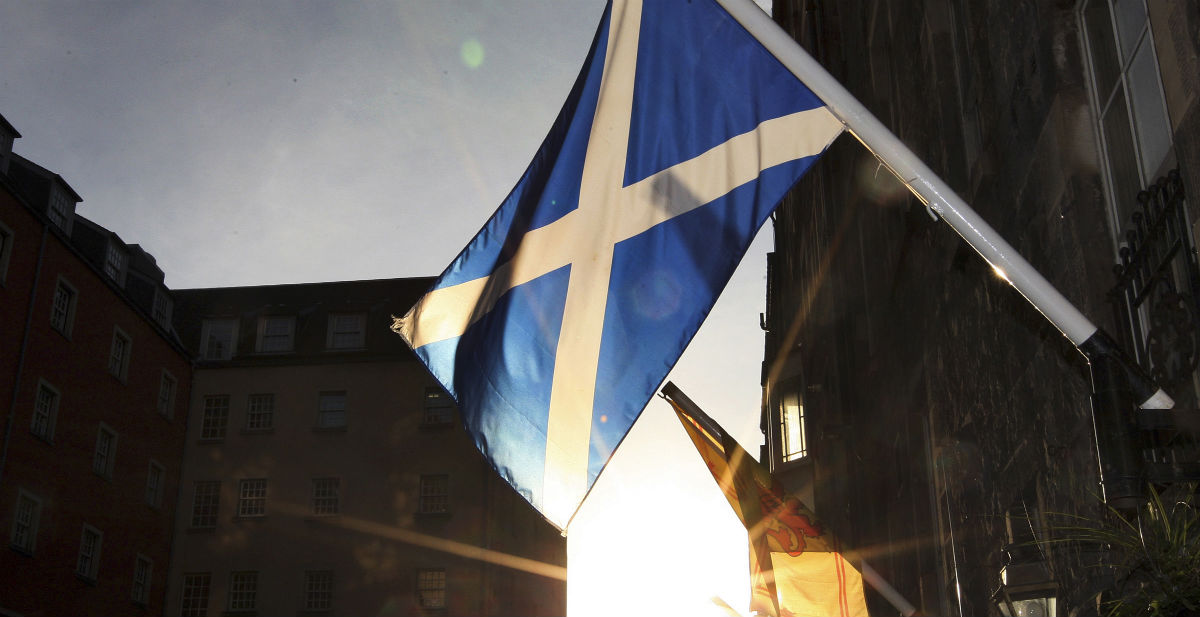No one in London took tomorrow’s referendum on Scottish independence seriously until last week. That was when a new TNS poll was released showing the vote was suddenly a dead heat.
Videos by Rare
Did Scotland want to detach from Britain? Thirty-nine percent said no and 38 percent said yes.
Alarms went off across the British political establishment. Suddenly what had long been regarded as a doomsday scenario was close to being reality. The leaders of Britain’s three major political parties parachuted into Scotland for some frenzied damage control.
“It would be a heartbreaking job to have to do, to break up this family of nations that has been such a success,” said Prime Minister David Cameron. He has good reason to be morose: he’s one point removed from being the leader who lost the United Kingdom. That’s a pretty ignominious page in the history books.
So why are Scots on the verge of ditching their three-hundred-year-old union?
One clue lies in foreign policy. As Daniel Larison notes, Alex Salmond, the bumptious leader of the Scottish National Party which is spearheading the independence movement, is pledging to stay out of baseless wars—a free Scotland wouldn’t follow Britain back into Iraq. Scotland is also the home of Britain’s Trident missile nuclear deterrent, which the SNP is threatening to ban and ship back to the UK. Nationalists think they can use Westminster’s unpopular foreign policy as leverage to pry Scotland away.
Salmond has also promised to make Scotland a member of the European Union. EU membership is much more controversial in England than in Scotland, and recently the United Kingdom Independence Party (UKIP) has had electoral success pledging to pull Britain out of the EU.
Salmond believes his country’s character is fundamentally distinct from England’s—a less trigger-happy Northern European welfare state with an economy greased by oil revenues, more Norway than UK. He and other SNP lawmakers have traveled to Scandinavia in recent years to discuss the prospect of an independent Scotland that looks north and east.
That might seem like a lousy prospect—another socialist government, another cog in the rusty EU bureaucracy. Isn’t Scotland removing its leash only to strap on a pair of shackles?
Perhaps. But there’s something else going on here. The beating pulse beneath Scottish independence isn’t socialism per se, but localism. Put simply: Scots are tired of being governed by a political class in London that feels alien to them. Put even more simply: they think the Scottish should make decisions for Scotland.
This is something British unionists may not have realized in time. Up until recently, the “Vote No” campaign has resembled a less sedated Ezra Klein, trotting out all manner of charts showing how the Scottish economy will implode if it detaches from the UK. This may be well-intentioned, but the message transmitted to the Scots has been: you poor saps can’t survive without us. To which the Scots’ natural response is: the hell we can’t.
This is part of a trend that isn’t limited to Edinburgh and Aberdeen. All over the Western world, there’s been a yearning for local identity. Not only is Scottish pride on the rise, but English pride is too, with some houses flying the red-and-white cross of St. George along with or instead of the traditional Union Jack. And any further devolution of power to Scotland, even short of independence, would likely spark similar cries for empowerment in Wales and Northern Ireland.
Ironically, Scottish independence could make Britain more fertile ground for UKIP, England’s own cry of rage against the remote and German-dominated European Union. UKIP, along with the American tea party, can be seen as channels for those who want to preserve their local identities from a distant political class that insists on trying to cram everyone into one-size-fits-all policies.
It’s a shift from the big and the distant to the small and the near, and it’s gained traction in recent years, even in something as seemingly inconsequential as our buying habits. After decades of consolidation, younger consumers are changing the business world by favoring small and authentic companies. Forty percent of Millennials say they like to buy local and 37 percent distrust big business in general. Customers are also moving their money from enormous financial firms to community banks.
There’s plenty of hypocrisy at work here, whether it’s the Scottish chucking off the UK only to join the EU, or Millennials voting for someone like Barack Obama who has no respect for local authority whatsoever. But it adds up to an emerging preference for local control over national hegemony. Increasingly people are wondering why they should support an alliance of big business and big government that continues to fatten itself despite having failed at everything it’s tried to do.
I don’t think the Scottish will vote for independence and I hope the British union remains solvent. But there’s something funny about London political elites bumbling around, trying to solve the riddle of why the Scottish might want to be governed by the Scottish.
Here’s a hint from a casual American observer: it has nothing to do with economics and everything to do with Scotland.



